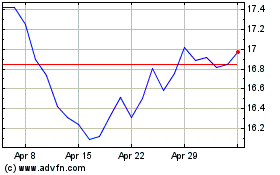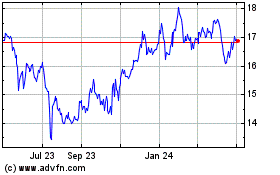Elliott Discloses AT&T Stake, Calls for Shake-Up -- 3rd Update
September 09 2019 - 10:25AM
Dow Jones News
By Drew FitzGerald
Activist investor Elliott Management Corp. disclosed a $3.2
billion stake in AT&T Inc., criticized the company's strategy
and called on the telecommunications giant to shed unnecessary
assets.
The New York hedge fund wrote in a letter to the company
released Monday that it would seek seats on the company's board and
challenged AT&T to sharpen its focus on its core assets,
including its relatively healthy wireless business.
The fund didn't ask AT&T to sell specific divisions but said
the company should review any assets that lack a strategic
rationale, including the DirecTV satellite service and Mexican
wireless operations.
With a market value of more than $260 billion, the Dallas
company is among the hedge fund's biggest corporate targets to
date. AT&T shares rose 4% to $37.80 in Monday morning
trading.
Elliott assailed AT&T management for alleged missteps
including the purchase of DirecTV and said it remains cautious
about last year's purchase of Time Warner Inc., a collection of TV
and film businesses including HBO and CNN that was renamed
WarnerMedia.
"AT&T has been an outlier in terms of its M&A strategy,"
Elliott wrote. "Most companies today no longer seek to assemble
conglomerates."
AT&T said it looked forward to engaging with the hedge
fund.
"Indeed, many of the actions outlined are ones we are already
executing today," the company said in a statement. "AT&T's
Board and management team firmly believe that the focused and
successful execution of our strategy is the best path forward to
create long-term value for shareholders. This strategy is driven by
the unique portfolio of valuable businesses we've assembled across
communications networks and media and entertainment."
AT&T Chief Executive Randall Stephenson has reshaped the
company in recent years by buying DirecTV and Time Warner, making
it one of the biggest U.S. media players. The deals left the
company with more than $170 billion in net debt at the end of
2018.
President Trump, a frequent critic of CNN, weighed in on the
news, tweeting: "Great news that an activist investor is now
involved with AT&T." As a presidential candidate in 2016, Mr.
Trump vowed to block AT&T's takeover of Time Warner. The
Justice Department filed an antitrust suit to stop the merger, but
AT&T prevailed in court.
Elliott, founded by billionaire Paul Singer, is one of the
biggest activist investors. Last year, the hedge fund launched the
equivalent of nearly one new public activism campaign every two
weeks, pushing for change at companies around the world including
Sempra Energy, Nielsen Holdings PLC and Pernod Ricard SA.
In its AT&T letter, Elliott said the company has
underperformed the market for the past decade and put much of the
blame on Mr. Stephenson's acquisition strategy.
"AT&T has transformed itself into a sprawling collection of
businesses battling well-funded competitors, in new markets, with
different regulations, and saddled with the financial repercussions
of its choices, " the fund said.
In addition to asset sales, Elliott called on AT&T to boost
its profit margins by cutting at least $5 billion in costs,
including outsourcing some functions, consolidating offices and
rethinking its retail footprint.
"While unsurprising for a former regulated monopoly which many
still liken to the federal government, AT&T suffers from a
bureaucratic organization," Elliot said, arguing that AT&T's
wireless profits have fallen further behind rival Verizon
Communications Inc.'s.
The challenge to the company's strategy comes less than a week
after AT&T named longtime executive John Stankey to its newly
created chief operating officer position, a move widely seen as
preparing him to eventually succeed Mr. Stephenson. Mr. Stankey
remains in charge of WarnerMedia and previously served as
AT&T's strategy chief.
Elliott questioned the executive change and asked whether
AT&T conducted an external review for the new No. 2
position.
The fund predicted that if AT&T pursues the strategic and
operational improvements Elliott suggests, the shares could be
worth more than $60 by the end of 2021.
AT&T shares closed Friday at $36.25 and have rallied in
recent months after starting the year around $30.
Entering the week, AT&T has posted a total shareholder
return -- or stock-price changes plus dividends -- of more than 20%
over the past year, compared with 5.8% for the S&P 500 and 14%
for Verizon.
Over the past five years, AT&T has posted a total
shareholder return of 6.6%, compared with 10.7% for the S&P 500
and 8.8% for Verizon.
Shares hit a multiyear low of $27.36 in December as investors
questioned whether its heavy debt load was sustainable. The company
has spent the past year shoring up its balance sheet, partly
through sales of assets such as its stake in streaming service Hulu
and its ownership of WarnerMedia's new Manhattan headquarters.
Write to Drew FitzGerald at andrew.fitzgerald@wsj.com
(END) Dow Jones Newswires
September 09, 2019 10:10 ET (14:10 GMT)
Copyright (c) 2019 Dow Jones & Company, Inc.
AT&T (NYSE:T)
Historical Stock Chart
From Mar 2024 to Apr 2024

AT&T (NYSE:T)
Historical Stock Chart
From Apr 2023 to Apr 2024
